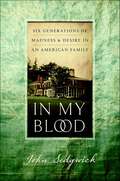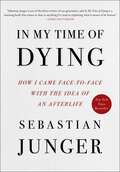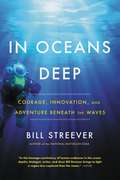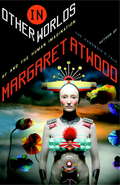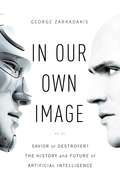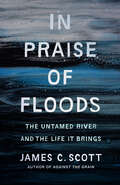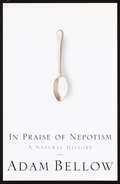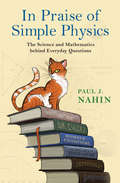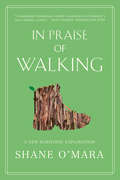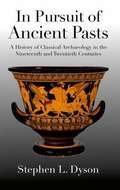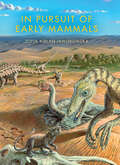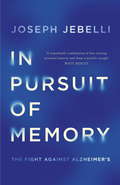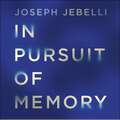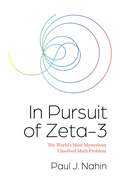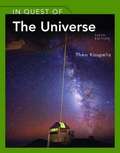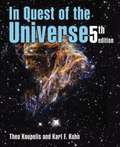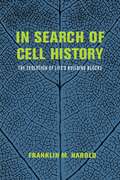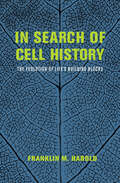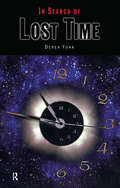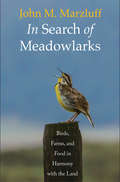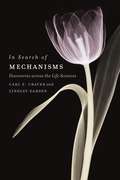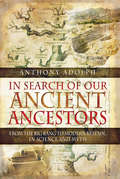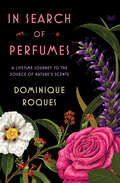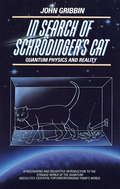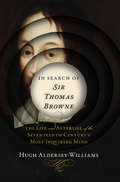- Table View
- List View
In My Blood: Six Generations of Madness & Desire in an American Family
by John SedgwickWhile working on his second novel, John Sedgwick spiraled into a depression so profound that it very nearly resulted in suicide. An author acclaimed for his intimate literary excursions into the rarified, moneyed enclave of Brahmin Boston, he decided to search for the roots of his malaise in the history of his own storied family—one of America's oldest and most notable. Following a bloodline that travels from Theodore Sedgwick, compatriot of George Washington and John Adams, to Edie Sedgwick, Andy Warhol's tragic muse, John Sedgwick's very personal journey of self-discovery became something far greater: a spellbinding study of the evolution of an extraordinary American family.
In My Time of Dying: How I Came Face to Face with the Idea of an Afterlife
by Sebastian JungerA near-fatal health emergency leads to this powerful reflection on death—and what might follow—by the bestselling author of Tribe and The Perfect Storm.For years as an award-winning war reporter, Sebastian Junger traveled to many front lines and frequently put his life at risk. And yet the closest he ever came to death was the summer of 2020 while spending a quiet afternoon at the New England home he shared with his wife and two young children. Crippled by abdominal pain, Junger was rushed to the hospital by ambulance. Once there, he began slipping away. As blackness encroached, he was visited by his dead father, inviting Junger to join him. &“It&’s okay,&” his father said. &“There&’s nothing to be scared of. I&’ll take care of you.&” That was the last thing Junger remembered until he came to the next day when he was told he had suffered a ruptured aneurysm that he should not have survived. This experience spurred Junger—a confirmed atheist raised by his physicist father to respect the empirical—to undertake a scientific, philosophical, and deeply personal examination of mortality and what happens after we die. How do we begin to process the brutal fact that any of us might perish unexpectedly on what begins as an ordinary day? How do we grapple with phenomena that science may be unable to explain? And what happens to a person, emotionally and spiritually, when forced to reckon with such existential questions? In My Time of Dying is part medical drama, part searing autobiography, and part rational inquiry into the ultimate unknowable mystery.
In Oceans Deep: Courage, Innovation, and Adventure Beneath the Waves
by Bill StreeverIn the spirit of Bill Bryson and Ian Frazier comes this fascinating examination of our past, present, and future beneath the waves.In an age of unprecedented exploration and innovation, our oceans remain largely unknown, and endlessly fascinating: full of mystery, danger, beauty, and inspiration. Bill Streever-a longtime deep-sea diver himself-has masterfully woven together the science and history of Earth's last remaining frontier: the sea. In Oceans Deep celebrates the daring pioneers who tested the limits of what the human body can endure under water: . free divers able to reach 300 feet on a single breath; engineers and scientists who uncovered the secrets of decompression; teenagers who built their own diving gear from discarded boilers and garden hoses in the 1930s; saturation divers who lived under water for weeks at a time in the 1960s; and the trailblazing men who voluntarily breathed experimental gases at pressures sufficient to trigger insanity.Tracing both the little-known history and exciting future of how we travel and study the depths, Streever's captivating journey includes seventeenth-century leather-hulled submarines, their nuclear-powered descendants, a workshop where luxury submersibles are built for billionaire clients, and robots capable of roving unsupervised between continents, revolutionizing access to the ocean. In this far-flung trip to the wild, night-dark place of shipwrecks, trapped submariners, oil wells, innovative technologies, and people willing to risk their lives while challenging the deep, we discover all the adventures our seas have to offer-and why they are in such dire need of conservation.
In Other Worlds: SF and the Human Imagination
by Margaret AtwoodNote: The electronic version of this title contains over thirty additional, illuminating eBook-exclusive illustrations by the author.At a time when speculative fiction seems less and less far-fetched, Margaret Atwood lends her distinctive voice and singular point of view to the genre in a series of essays that brilliantly illuminates the essential truths about the modern world. This is an exploration of her relationship with the literary form we have come to know as "science fiction," a relationship that has been lifelong, stretching from her days as a child reader in the 1940s, through her time as a graduate student at Harvard, where she worked on the Victorian ancestor of the form, and continuing as a writer and reviewer. This book brings together her three heretofore unpublished Ellmann Lectures from 2010: "Flying Rabbits," which begins with Atwood's early rabbit superhero creations, and goes on to speculate about masks, capes, weakling alter egos, and Things with Wings; "Burning Bushes," which follows her into Victorian otherlands and beyond; and "Dire Cartographies," which investigates Utopias and Dystopias. In Other Worlds also includes some of Atwood's key reviews and thoughts about the form. Among those writers discussed are Marge Piercy, Rider Haggard, Ursula Le Guin, Ishiguro, Bryher, Huxley, and Jonathan Swift. She elucidates the differences (as she sees them) between "science fiction" proper, and "speculative fiction," as well as between "sword and sorcery/fantasy" and "slipstream fiction." For all readers who have loved The Handmaid's Tale, Oryx and Crake, and The Year of the Flood, In Other Worlds is a must. From the Hardcover edition.
In Our Own Image: Savior or Destroyer? The History and Future of Artificial Intelligence
by George ZarkadakisA timely and important book that explores the history and future, as well as the societal and ethical implications, of Artificial Intelligence as we approach the cusp of a fourth industrial revolution Zarkadakis explores one of humankind's oldest love-hate relationships—our ties with artificial intelligence, or AI. He traces AI's origins in ancient myth, through literary classics like Frankenstein, to today's sci-fi blockbusters, arguing that a fascination with AI is hardwired into the human psyche. He explains AI's history, technology, and potential; its manifestations in intelligent machines; its connections to neurology and consciousness, as well as—perhaps most tellingly—what AI reveals about us as human beings. In Our Own Image argues that we are on the brink of a fourth industrial revolution—poised to enter the age of Artificial Intelligence as science fiction becomes science fact. Ultimately, Zarkadakis observes, the fate of AI has profound implications for the future of science and humanity itself.
In Praise of Floods: The Untamed River and the Life It Brings (Yale Agrarian Studies Series)
by James C. ScottJames C. Scott reframes rivers as alive and dynamic, revealing the consequences of treating them as resources for our profit Rivers, on a long view, are alive. They are born; they change; they shift their channels; they forge new routes to the sea; they move both gradually and violently; they can teem (usually) with life; they may die a quasi-natural death; they are frequently maimed and even murdered. It is the annual flood pulse—the brief time when the river occupies the floodplain—that gives a river its vitality, but it is human engineering that kills it, suppressing the flood pulse with dams, irrigation, siltation, dikes, and levees. In demonstrating these threats to the riverine world, award-winning author James C. Scott examines the life history of a particular river, the Ayeyarwady (Irrawaddy) of Burma, the heartland and superhighway of Burman culture. Scott opens our understanding of rivers to encompass their entirety—tributaries, wetlands, floodplains, backwaters, eddies, periodic marshlands, and the assemblage of life forms dependent on rivers for their existence and well-being. For anyone interested in the Anthropocene and the Great Acceleration, rivers offer a striking example of the consequences of human intervention in trying to control and domesticate a natural process, the complexity and variability of which we barely understand.
In Praise of Nepotism: A Natural History
by Adam BellowThe causes and effects of nepotism throughout human history.
In Praise of Simple Physics: The Science and Mathematics behind Everyday Questions
by Paul J. NahinPhysics can explain many of the things that we commonly encounter. It can tell us why the night is dark, what causes the tides, and even how best to catch a baseball. With In Praise of Simple Physics, popular math and science writer Paul Nahin presents a plethora of situations that explore the science and math behind the wonders of everyday life. Roaming through a diverse range of puzzles, he illustrates how physics shows us ways to wring more energy from renewable sources, to measure the gravity in our car garages, to figure out which of three light switches in the basement controls the light bulb in the attic, and much, much more.How fast can you travel from London to Paris? How do scientists calculate the energy of an atomic bomb explosion? How do you kick a football so it stays in the air and goes a long way downfield? Nahin begins with simpler problems and progresses to more challenging questions, and his entertaining, accessible, and scientifically and mathematically informed explanations are all punctuated by his trademark humor. Readers are presumed to have some background in beginning differential and integral calculus. Whether you simply have a personal interest in physics' influence in the world or you're an engineering and science student who wants to gain more physics know-how, this book has an intriguing scenario for you.In Praise of Simple Physics proves that if we look carefully at the world around us, physics has answers for the most astonishing day-to-day occurrences.
In Praise of Walking: A New Scientific Exploration
by Shane O'MaraA hymn to walking, the mechanical magic at the core of our humanity. In this captivating book, neuroscientist Shane O’Mara invites us to marvel at the benefits walking confers on our bodies and brains, and to appreciate the advantages of this uniquely human skill. From walking’s evolutionary origins, traced back millions of years to life forms on the ocean floor, to new findings from cutting-edge research, he reveals how the brain and nervous system give us the ability to balance, weave through a crowded city, and run our “inner GPS” system. Walking is good for our muscles and posture; it helps to protect and repair organs, and can slow or turn back the aging of our brains. With our minds in motion we think more creatively, our mood improves, and stress levels fall. Walking together to achieve a shared purpose is also a social glue that has contributed to our survival as a species. As our lives become increasingly sedentary, O’Mara makes the case that we must start walking again—whether it’s up a mountain, down to the park, or simply to school and work. In Praise of Walking illuminates the joys, health benefits, and mechanics of walking, and reminds us to get out of our chairs and discover a happier, healthier, more creative self.
In Pursuit of Ancient Pasts: A History of Classical Archaeology in the Nineteenth and Twentieth Centuries
by Stephen L. DysonThe stories behind the acquisition of ancient antiquities are often as important as those that tell of their creation. This fascinating book provides a comprehensive account of the history and development of classical archaeology, explaining how and why artifacts have moved from foreign soil to collections around the world. As archaeologist Stephen Dyson shows, Greek and Roman archaeological study was closely intertwined with ideas about class and social structure; the rise of nationalism and later political ideologies such as fascism; and the physical and cultural development of most of the important art museums in Europe and the United States, whose prestige depended on their creation of collections of classical art. Accompanied by a discussion of the history of each of the major national traditions and their significant figures, this lively book shows how classical archaeology has influenced attitudes about areas as wide-ranging as tourism, nationalism, the role of the museum, and historicism in nineteenth- and twentieth-century art.
In Pursuit of Early Mammals (Life of the Past)
by Zofia Kielan-Jaworowska“Mesozoic mammal fossils are the focus of this fascinating book, which reviews both the fossils themselves and the history of their discovery.” —ChoiceIn Pursuit of Early Mammals presents the history of the mammals that lived during the Mesozoic era, the time when dinosaurs ruled the Earth, and describes their origins, anatomy, systematics, paleobiology, and distribution. It also tells the story of the author, a world-renowned specialist on these animals, and the other prominent paleontologists who have studied them. Zofia Kielan-Jaworowska was the first woman to lead large-scale paleontological expeditions, including eight to the Gobi Desert in Mongolia, which brought back important collections of dinosaur, early mammal, and other fossils. She shares the difficulties and pleasures encountered in finding rare fossils and describes the changing views on early mammals made possible by these discoveries.“A thorough review of the current state of early mammalian paleontology presented through the unique historical filter of someone who was at the foremost of the field for over half a century.” —The Quarterly Review of Biology“Whether she’s talking about how mammals evolved their distinctive ear bones, or how she built a cabin out of plywood during a particularly cold field season in the Gobi, you know that a remarkable, passionate person is telling a story of science and adventure in her own words.” —Priscum“A fascinating window into the development of the field . . . The perspective of an individual at the center of these developments is captivating, informative, and has never before been published.” —Gregory P. Wilson, University of Washington
In Pursuit of Memory: The Fight Against Alzheimer's: Shortlisted for the Royal Society Prize
by Dr Joseph JebelliWhen Joseph Jebelli was twelve, his beloved grandfather began to act very strangely. It started with inexplicable walks, and gradually his bright smiles were replaced by a fearful, withdrawn expression. Before long, he didn't recognise his family any more. Dr Jebelli has dedicated his career to understanding Alzheimer's disease, which affects millions worldwide and 850,000 people in the UK alone. In this, his first book, Jebelli explores the past, present and future of Alzheimer's disease starting from the very beginning - the first recorded case more than one hundred years ago - right up to the cutting-edge research being done today. It is a story as good as any detective novel, taking us to nineteenth-century Germany and post-war England; to the jungles of Papua New Guinea and the technological proving grounds of Japan; to America, India, China, Iceland, Sweden, and Colombia; and to the cloud-capped spires of the most elite academic institutions. Its heroes are expert scientists from around the world - but also the incredibly brave patients and families who have changed the way scientists think about Alzheimer's, unveiling a pandemic that took us centuries to track down, and above all, reminding everyone never to take memory - our most prized possession - for granted. Based upon years of meticulous research, In Pursuit of Memory is a compelling insider's account of this terrible disease and the scientists who are trying to find a cure against the clock.
In Pursuit of Memory: The Fight Against Alzheimer's: Shortlisted for the Royal Society Prize
by Dr Joseph JebelliWhen Joseph Jebelli was twelve, his beloved grandfather began to act very strangely. It started with inexplicable walks, and gradually his bright smiles were replaced by a fearful, withdrawn expression. Before long, he didn't recognise his family any more. Dr Jebelli has dedicated his career to understanding Alzheimer's disease, which affects millions worldwide and 850,000 people in the UK alone. In this, his first book, Jebelli explores the past, present and future of Alzheimer's disease starting from the very beginning - the first recorded case more than one hundred years ago - right up to the cutting-edge research being done today. It is a story as good as any detective novel, taking us to nineteenth-century Germany and post-war England; to the jungles of Papua New Guinea and the technological proving grounds of Japan; to America, India, China, Iceland, Sweden, and Colombia; and to the cloud-capped spires of the most elite academic institutions. Its heroes are expert scientists from around the world - but also the incredibly brave patients and families who have changed the way scientists think about Alzheimer's, unveiling a pandemic that took us centuries to track down, and above all, reminding everyone never to take memory - our most prized possession - for granted. Based upon years of meticulous research, In Pursuit of Memory is a compelling insider's account of this terrible disease and the scientists who are trying to find a cure against the clock.(P)2017 John Murray Press
In Pursuit of Zeta-3: The World's Most Mysterious Unsolved Math Problem
by Paul J. NahinAn engrossing look at the history and importance of a centuries-old but still unanswered math problemFor centuries, mathematicians the world over have tried, and failed, to solve the zeta-3 problem. Math genius Leonhard Euler attempted it in the 1700s and came up short. The straightforward puzzle considers if there exists a simple symbolic formula for the following: 1+(1/2)^3+(1/3)^3+(1/4)^3+. . . . But why is this issue—the sum of the reciprocals of the positive integers cubed—so important? With In Pursuit of Zeta-3, popular math writer Paul Nahin investigates the history and significance of this mathematical conundrum.Drawing on detailed examples, historical anecdotes, and even occasionally poetry, Nahin sheds light on the richness of the nature of zeta-3. He shows its intimate connections to the Riemann hypothesis, another mathematical mystery that has stumped mathematicians for nearly two centuries. He looks at its links with Euler’s achievements and explores the modern research area of Euler sums, where zeta-3 occurs frequently. An exact solution to the zeta-3 question wouldn’t simply satisfy pure mathematical interest: it would have critical ramifications for applications in physics and engineering, such as quantum electrodynamics. Challenge problems with detailed solutions and MATLAB code are included at the end of each of the book’s sections.Detailing the trials and tribulations of mathematicians who have approached one of the field’s great unsolved riddles, In Pursuit of Zeta-3 will tantalize curious math enthusiasts everywhere.
In Quest of the Universe (6th edition)
by Theo KoupelisThe book is a comprehensive, student-friendly introduction to astronomy. This accessible text guides readers through the development of historical and current astronomical theories to provide a clear account of how science works. With numerous interactive learning tools, the Starry Night planetary software package, and stunning visuals and up-to-date content, In Quest with the Universe, Sixth Edition is an exciting overview of this ever-changing discipline.
In Quest Of The Universe (5th edition)
by Theo Koupelis Karl F. KuhnThis volume introduces the subject of astronomy to non-science majors. Koupelis (U. of Wisconsin-Marathon County) and Kuhn (Eastern Kentucky U. ) present astronomy in the traditional order of solar system, stars, and galaxies, emphasizing the historical development of science and technology and moving from the familiar to the less familiar. Revised and updated throughout, this edition contains a new introductory chapter on the night sky, discussion of the criteria for scientific models, expanded information on the dynamo model, important astronomical findings such as the latest discoveries on Mars, and more on Saturn's moons and dark matter. There is also a new section on active and adaptive optics, discussion of the recent IAU decision on the definition of a planet, and other expanded material, as well as new images. Each chapter has a study guide. A CD-ROM is included, with an electronic study guide, practice questions, flash cards, animations, and the Stellarium planetarium software.
In Search of Cell History: The Evolution of Life's Building Blocks
by Franklin M. HaroldThe origin of cells remains one of the most fundamental problems in biology, one that over the past two decades has spawned a large body of research and debate. With In Search of Cell History, Franklin M. Harold offers a comprehensive, impartial take on that research and the controversies that keep the field in turmoil. Written in accessible language and complemented by a glossary for easy reference, this book investigates the full scope of cellular history. Assuming only a basic knowledge of cell biology, Harold examines such pivotal subjects as the relationship between cells and genes; the central role of bioenergetics in the origin of life; the status of the universal tree of life with its three stems and viral outliers; and the controversies surrounding the last universal common ancestor. He also delves deeply into the evolution of cellular organization, the origin of complex cells, and the incorporation of symbiotic organelles, and considers the fossil evidence for the earliest life on earth. In Search of Cell History shows us just how far we have come in understanding cell evolution--and the evolution of life in general--and how far we still have to go.
In Search of Cell History: The Evolution of Life's Building Blocks
by Franklin M. HaroldThis comprehensive history of cell evolution &“deftly discusses the definition of life&” as well as cellular organization, classification and more (San Francisco Book Review). The origin of cells remains one of the most fundamental mysteries in biology, one that has spawned a large body of research and debate over the past two decades. With In Search of Cell History, Franklin M. Harold offers a comprehensive, impartial take on that research and the controversies that keep the field in turmoil. Written in accessible language and complemented by a glossary for easy reference, this book examines the relationship between cells and genes; the central role of bioenergetics in the origin of life; the status of the universal tree of life with its three stems and viral outliers; and the controversies surrounding the last universal common ancestor. Harold also discusses the evolution of cellular organization, the origin of complex cells, and the incorporation of symbiotic organelles. In Search of Cell History shows us just how far we have come in understanding cell evolution—and the evolution of life in general—and how far we still have to go. &“Wonderful…A loving distillation of connections within the incredible diversity of life in the biosphere, framing one of biology&’s most important remaining questions: how did life begin?&”—Nature
In Search of Lost Time
by D YorkDo you know that black holes can affect time?that Stonehenge is a giant calendar?that the Oracle Bones of the North China Plain predict the phases of the moon?that the Pyramids are giant compasses?how Jonathan Swift knew that Mars had two moons when he wrote Gulliver's Travels?that the effects of black holes are described i
In Search of Meadowlarks: Birds, Farms, and Food in Harmony with the Land
by John M. MarzluffAn ornithologist&’s personal look at farming practices that finds practical solutions for sustainable food production compatible with bird and wildlife conservation With predictions of a human population of more than nine billion by the middle of this century and eleven billion by 2100, we stand at a crossroads in our agricultural evolution. In this clear and engaging yet scientifically rigorous book, wildlife biologist John M. Marzluff takes a personal approach to sustainable agriculture. He travels to farms and ranches across North and Central America, including a Nebraska corn and soybean farm, California vineyards, cattle ranches in Montana, and small sustainable farms in Costa Rica, to understand the unique challenges and solutions to sustainable food production. Agriculture and wildlife can coexist, he argues, if farmers are justly rewarded for conservation; if future technological advancements increase food production and reduce food waste; and if consumers cut back on meat consumption. Beginning with a look backwards at our evolutionary history and concluding with practical solutions for change that will benefit farmers and ranchers, Marzluff provides an accessible and insightful study for the ecologically minded citizen, farmer, rancher, or conservationist.
In Search of Mechanisms: Discoveries across the Life Sciences
by Carl F. Craver Lindley DardenNeuroscientists investigate the mechanisms of spatial memory. Molecular biologists study the mechanisms of protein synthesis and the myriad mechanisms of gene regulation. Ecologists study nutrient cycling mechanisms and their devastating imbalances in estuaries such as the Chesapeake Bay. In fact, much of biology and its history involves biologists constructing, evaluating, and revising their understanding of mechanisms. With In Search of Mechanisms, Carl F. Craver and Lindley Darden offer both a descriptive and an instructional account of how biologists discover mechanisms. Drawing on examples from across the life sciences and through the centuries, Craver and Darden compile an impressive toolbox of strategies that biologists have used and will use again to reveal the mechanisms that produce, underlie, or maintain the phenomena characteristic of living things. They discuss the questions that figure in the search for mechanisms, characterizing the experimental, observational, and conceptual considerations used to answer them, all the while providing examples from the history of biology to highlight the kinds of evidence and reasoning strategies employed to assess mechanisms. At a deeper level, Craver and Darden pose a systematic view of what biology is, of how biology makes progress, of how biological discoveries are and might be made, and of why knowledge of biological mechanisms is important for the future of the human species.
In Search of Our Ancient Ancestors: From the Big Bang to Modern Britain, In Science and Myth
by Anthony AdolphA top genealogist &“shows how genetics helps and how it roots each of us in this magnificent story of Life on Earth in the most meaningful way imaginable.&”—Reunite Magazine &“What a fine long pedigree you have given the human race.&”—Charles Darwin to Charles Lyell, 1863 How distantly are we related to dinosaurs? How much of your DNA came from Neanderthals? How are the builders of Stonehenge connected to great-grandpa? According to science, life first appeared on Earth about 3,500 million years ago. Every living thing is descended from that first spark, including all of us. But if we trace a direct line down from those original life forms to ourselves, what do we find? What is the full story of our family tree over the past 3,500 million years, and how are we able to trace ourselves so far back? From single-celled organisms to sea-dwelling vertebrates; amphibians to reptiles; tiny mammals to primitive man; the first Homo sapiens to the cave painters of Ice Age Europe and the first farmers down to the Norman Conquest, this book charts not only the extraordinary story of our ancient ancestors but also our 40,000-year-long quest to discover our roots, from ancient origin myths of world-shaping mammoths and great floods down to the scientific discovery of our descent from the Genetic Adam and the Mitochondrial Eve. &“Having read it I&’m still slightly shell-shocked by the range of topics that he covers, from the origins of the universe and life on Earth to the present-day DNA analysis that aims to answer some of our questions about our past. And everything in between!&”—LostCousins
In Search of Perfumes: A Lifetime Journey to the Source of Nature's Scents
by Dominique Roques"[An] immersive debut... with detailed accounts of his trips and vivid descriptions of the scents ... [Roques'] rich travelogue will transport readers." – Publishers Weekly (Starred Review)In this intoxicating concoction of history, travelogue, and memoir, one of the perfume industry’s leading scouts of natural ingredients tells the story of the precious ingredients needed to make our favorite fragrances.Do you know how many flowers it takes to produce a kilo of rose oil? One million roses, each handpicked. When it comes to nature, Dominique Roques is a unique authority. He has spent the last thirty years working closely with local communities across the globe to establish a sustainable supply of natural ingredients crucial to perfume making.From resin cultivated by traditional methods in El Salvador to rose oil distilleries in India as old as the Taj Mahal, his network reveals an elusive trade built on the fault lines of tradition and modernity. With In Search of Perfumes, Roques tells the story of seventeen of the industry’s most precious ingredients–where they come from, their cultural and historic significance, and why we love them—from Indonesian patchouli to the "Damask rose,” interweaving his own recollections and reflections on his life and work.From Andalusia to Somaliland, Roques takes us on an exclusive tour of a vast but delicate ecosystem wholly sustained by the artisans who are its caretakers. Isolated and rural, the tropical jungles of northern Laos remain to this day the only source of benzoin that centuries earlier wafted through the air of Louis XIV’s court. In Madagascar, where every transaction is made in cash, a caravan of porters carry pallets bearing $500,000 dollars to exchange for vanilla beans. The Venezuelan tonka bean, as fickle as the weather, may refuse to flower for years but is so esteemed by perfumers that patience becomes its truest virtue. Everywhere Roques takes us, his infectious curiosity and amiability illuminate an immersive world of the uncharted.Entertaining and eye-opening, decorated with beautiful black-and-white illustrations, In Search of Perfumes is an irresistible exploration of the smells that fuel our nostalgia and suffuse our fantasies.Translated from the French by Stephanie SmeeSupplemental enhancement PDF accompanies the audiobook.
In Search of Schrodinger's Cat
by John GribbinQuantum theory is so shocking that Einstein could not bring himself to accept it. It is so important that it provides the fundamental underpinning of all modern sciences. Without it, we'd have no nuclear power or nuclear weapons, no TV, no computers, no science of molecular biology, no understanding of DNA, no genetic engineering. In Search of Schrodinger's Cat tells the complete story of quantum mechanics, a truth stranger than any fiction. John Gribbin takes us step by step into an ever more bizarre and fascinating place, requiring only that we approach it with an open mind. He introduces the scientists who developed quantum theory. He investigates the atom, radiation, time travel, the birth of the universe, superconductors and life itself. And in a world full of its own delights, mysteries and surprises, he searches for Schrodinger's Cat - a search for quantum reality - as he brings every reader to a clear understanding of the most important area of scientific study today - quantum physics. In Search of Schrodinger's Cat is a fascinating and delightful introduction to the strange world of the quantum - an essential element in understanding today's world.From the Trade Paperback edition.
In Search of Sir Thomas Browne: The Life and Afterlife of the Seventeenth Century's Most Inquiring Mind
by Hugh Aldersey-WilliamsThe extraordinary life and ideas of one of the greatest--and most neglected--minds in history. Sir Thomas Browne (1605-1682) was an English writer, physician, and philosopher whose work has inspired everyone from Ralph Waldo Emerson to Jorge Luis Borges, Virginia Woolf to Stephen Jay Gould. In an intellectual adventure like Sarah Bakewell's book about Montaigne, How to Live, Hugh Aldersey-Williams sets off not just to tell the story of Browne's life but to champion his skeptical nature and inquiring mind. Mixing botany, etymology, medicine, and literary history, Aldersey-Williams journeys in his hero's footsteps to introduce us to witches, zealots, natural wonders, and fabulous creatures of Browne's time and ours. We meet Browne the master prose stylist, responsible for introducing hundreds of words into English, including electricity, hallucination, and suicide. Aldersey-Williams reveals how Browne's preoccupations--how to disabuse the credulous of their foolish beliefs, what to make of order in nature, how to unite science and religion--are relevant today. In Search of Sir Thomas Browne is more than just a biography--it is a cabinet of wonders and an argument that Browne, standing at the very gates of modern science, remains an inquiring mind for our own time. As Stephen Greenblatt has written, Browne is "unnervingly one of our most adventurous contemporaries."
